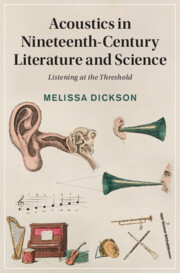Book contents
- Acoustics in Nineteenth-Century Literature and Science
- Cambridge studies in nineteenth-century Literature and culture
- Acoustics in Nineteenth-Century Literature and Science: Listening at the Threshold
- Copyright page
- Contents
- Figures
- Acknowledgements
- Introduction Whispers in the Roar
- Part I
- Part II
- Part III
- Part IV
- Chapter 9 Mesmeric Soundscapes
- Chapter 10 ‘The Individual Operated Upon’
- Conclusion
- Notes
- Select Bibliography
- Index
- Cambridge studies in nineteenth-century Literature and culture
Chapter 10 - ‘The Individual Operated Upon’
Powers of Mind and Music in George Du Maurier’s Trilby
from Part IV
Published online by Cambridge University Press: 13 December 2024
- Acoustics in Nineteenth-Century Literature and Science
- Cambridge studies in nineteenth-century Literature and culture
- Acoustics in Nineteenth-Century Literature and Science: Listening at the Threshold
- Copyright page
- Contents
- Figures
- Acknowledgements
- Introduction Whispers in the Roar
- Part I
- Part II
- Part III
- Part IV
- Chapter 9 Mesmeric Soundscapes
- Chapter 10 ‘The Individual Operated Upon’
- Conclusion
- Notes
- Select Bibliography
- Index
- Cambridge studies in nineteenth-century Literature and culture
Summary
Chapter 10 analyses nineteenth-century scientific and philosophical debates surrounding hypnotism by way of a close reading of George Du Maurier’s Trilby (1894). Criticism of Trilby has tended to focus on the extraordinary powers of Svengali to seize control of another’s consciousness in order to conduct their preternatural performances. I, however, attend to the intricately constructed physiological and psychological interiority of Trilby O’Ferrall and to the hidden spaces of the mind and body which constitute the complex, multilayered selves with which Du Maurier’s novel is preoccupied. Du Maurier, I argue, conceives of human selfhood in distinctly materialist terms, as a complicated series of caverns and recesses holding experiences and emotions, dreams and memories, latent talents, and the deep impressions of desire, pain, and trauma. His fiction probes the ways in which those depths might be sounded. In the case of Trilby, I argue, this investigation is primarily an acoustic and musical one.
Keywords
- Type
- Chapter
- Information
- Acoustics in Nineteenth-Century Literature and ScienceListening at the Threshold, pp. 199 - 222Publisher: Cambridge University PressPrint publication year: 2024

